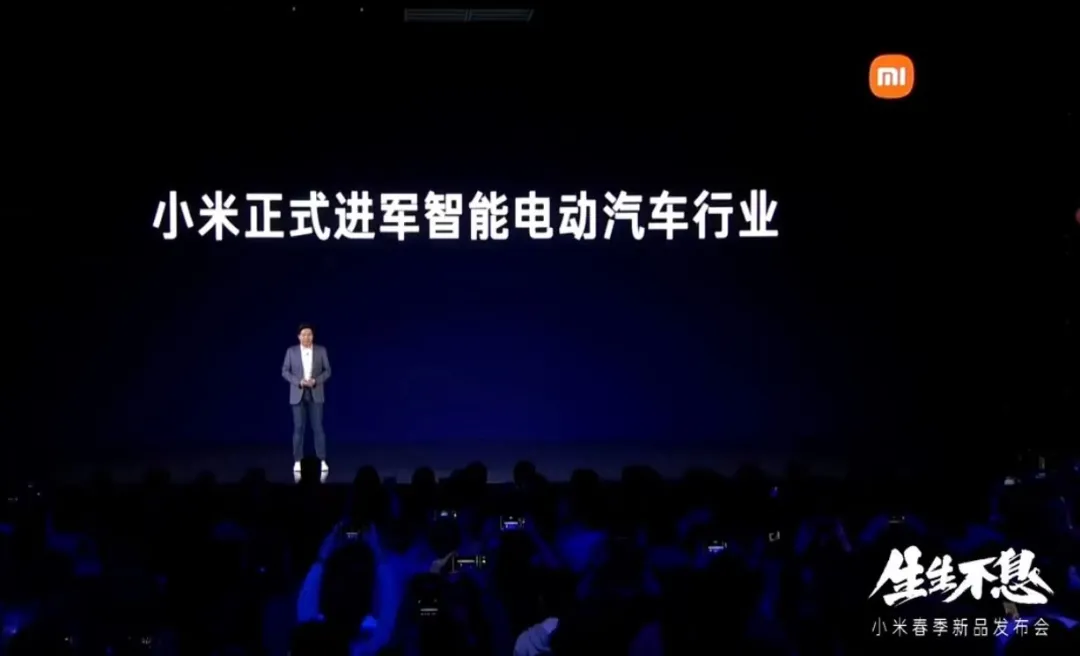It’s Coming: Xiaomi Officially Announces Smart Electric Vehicle Business
After being teased for years as the company that might make the first electric vehicle for young people, Xiaomi has finally confirmed its plans to enter into the EV market.
In an announcement made on the Hong Kong stock exchange today, Xiaomi stated that it has officially kicked off its smart electric vehicle business by forming a 100% wholly-owned subsidiary with an initial investment of RMB 10 billion ($1.52 billion). This subsidiary will be solely responsible for the EV business and will see up to $10 billion in investment over the next 10 years. Lei Jun, the CEO and co-founder of Xiaomi, will serve as the CEO of the new company.
During the Xiaomi product event held later in the evening, Jun declared that the EV business may be his last “major startup project,” indicating the ambitious scale of the automaker’s EV endeavors.
Why Did Xiaomi Finally Decide to Enter the EV Market?
Xiaomi has dominated the smart phone market over the past decade with its excellent products and the overall growth of the smartphone market. It has become one of the top three smartphone companies globally. Yet, the company is now entering a new period where the smartphone market has become saturated and the era of fast growth has ended.
The EV market, on the other hand, is showing strong potential for growth. Despite the intense competition from traditional automakers and emerging EV startups like Tesla, there is still room for more players in the market. The arrival of more competitors will push automotive innovation even further.
Xiaomi has been investing heavily in the EV market for some time now, preparing for this moment. It has invested in EV makers like NIO and XPeng, autonomous driving tech companies, semiconductor maker BYD, and even established a joint lab with BYD. It’s not just about EVs, however. Xiaomi has also been investing heavily in the smart home market, thus building up a strong AIoT ecosystem that includes nearly every aspect of daily life. Smart EVs are an essential part of this ecosystem.
The potential of both the EV market and AIoT market is massive and has attracted many investors’ attention. The recent news of Xiaomi entering the EV market has given its stock price a boost, further proving the company’s potential.
Can a Smartphone Manufacturer Like Xiaomi Build a Good Electric Vehicle?
Xiaomi’s Car Making
Xiaomi’s entry into the car making industry easily reminds us of other newcomers in the automotive field, such as Huawei. At the beginning of entering the automotive industry, Huawei aimed at the incremental market of electrification and intelligence, first focusing on being a supplier in this market, which undoubtedly made itself more targeted in this new field of automotive. Baidu, also in the field of internet cars, took a detour and cooperated with traditional car companies to jointly build intelligent cabins and opened up the road to autonomous driving through the Apollo platform. When the time is ripe, it will choose to enter the automotive industry as a vehicle manufacturer.

Compared with the above two companies, Xiaomi’s decision to devote itself wholeheartedly to car making is obviously much more radical, with “RMB 10 billion in capital injection”, “USD 10 billion investment in the next 10 years”, and “RMB 1080 cash reserves”, directly entering the car manufacturing industry with full self-financing. Although the slogan is shocking, everyone has long been aware of the cost of “burning money” in the automotive industry. Moreover, car manufacturing not only requires funds, but also time and technology support that interconnect with each other. Huawei has experienced 8 years from announcing its entry into the car networking industry to joint car production with traditional car companies. Baidu Apollo has also experienced more than 4 years from the project proposal to announcing car production. How much time does Xiaomi have in the field of electric vehicles today?

Let’s take a closer look at the most critical “core technology” of car production. Nowadays, in the field of electric vehicles, it is no longer an era where cars can be produced simply by “assembling” components from suppliers. The competition among various companies has reached the differentiation stage, so more and more companies are deeply involved in independent research and development, or joint development with technology companies. In “We looked at 20,000 patents and tried to put together a picture of Xiaomi’s car”, we can see that Xiaomi has long invested in the field of automobiles, but patents mainly revolve around the construction of smart ecosystems, intelligent cabins, and vehicle networking closely related to communications, and have not involved too much automotive hardware or body structure patents. The creation of ecosystems and personalized functions undoubtedly constitute Xiaomi’s biggest advantages. With a vast number of smartphone users and a rich variety of IoT products, Xiaomi brings boundless imagination to the development of intelligent and networked functions for vehicles. However, the implementation of these functions cannot be achieved without the support of the underlying electrical and electronic architecture and intermediate connections. The creation of an electronic and electrical architecture cannot be completely entrusted to a supplier. Xiaomi must either develop it on its own or participate deeply in its research and development.We found in Xiaomi’s 2020 financial report that the company invested 9.3 billion yuan in R&D, accounting for approximately 3.78% of its total revenue. Compared to Huawei’s long-term investment of 10~15%, and ZTE’s 14.59%, Xiaomi can hardly be considered a “heavy R&D” company. As a latecomer, how can Xiaomi catch up with those “heavy R&D” pioneers?
Conclusion
Although it seems difficult for Xiaomi to enter the car manufacturing industry, Xiaomi seems to have a natural affinity with audiences. Its vast user base of mobile phones and widespread smart home products have brought many fans to the upcoming “Xiaomi car.” The development of smart cars redefines the relationship between cars and users. Users are no longer just participants in the usage phase, but also actively involved in the R&D process through smart experiences and feedback. Xiaomi and its Mi fans, who are user-oriented, have unique advantages in the era of smart cars.
Therefore, what everyone is looking forward to is not just what the Xiaomi car will look like, but also their expectations for the “Young people’s first car.” They hope that it can stir up the field of smart cars, just like how the Xiaomi phone disrupted the smartphone industry.
This article is a translation by ChatGPT of a Chinese report from 42HOW. If you have any questions about it, please email bd@42how.com.
